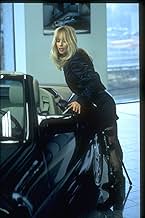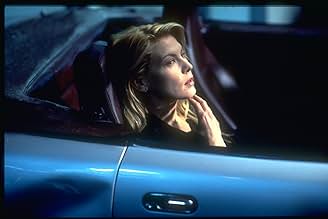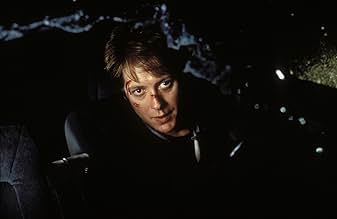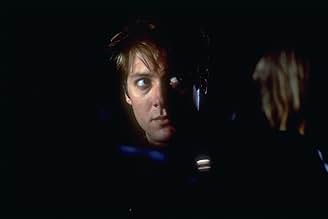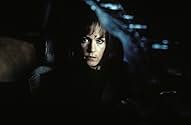Un director de televisión intenta utilizar su adrenalina después de un accidente de coche para revitalizar la vida sexual con su mujer.Un director de televisión intenta utilizar su adrenalina después de un accidente de coche para revitalizar la vida sexual con su mujer.Un director de televisión intenta utilizar su adrenalina después de un accidente de coche para revitalizar la vida sexual con su mujer.
- Dirección
- Guionistas
- Elenco
- Premios
- 9 premios ganados y 6 nominaciones en total
Deborah Kara Unger
- Catherine Ballard
- (as Deborah Unger)
David Cronenberg
- Auto Wreck Salesman
- (voz)
- (sin créditos)
Jordan-Patrick Marcantonio
- Man in Tattoo Parlor
- (sin créditos)
- Dirección
- Guionistas
- Todo el elenco y el equipo
- Producción, taquilla y más en IMDbPro
Opiniones destacadas
James Ballard, a TV director who is going through a complicated phase at a professional and personal level, suffers a car accident that transports him to an urban sub-culture, where victims of car accidents have sex in order to rejuvenate and give meaning to their lives.
It's a bizarre film, at least, dark, psychologically disturbing, and uncomfortable, for the vast majority of the audience.
This film explores certain psychological changes that a person may suffer after a trauma, instincts and ingrained desires, which needed the right moment to emerge.
The characters are cold, lacking a solid background, disconnected from emotions, which are linked only by carnal attraction and the primitive and violent sexual desire.
It's a metaphor about our relationship with technology and the progressive loss of connections with other individuals, but I don't think it had the best execution.
It's a bizarre film, at least, dark, psychologically disturbing, and uncomfortable, for the vast majority of the audience.
This film explores certain psychological changes that a person may suffer after a trauma, instincts and ingrained desires, which needed the right moment to emerge.
The characters are cold, lacking a solid background, disconnected from emotions, which are linked only by carnal attraction and the primitive and violent sexual desire.
It's a metaphor about our relationship with technology and the progressive loss of connections with other individuals, but I don't think it had the best execution.
David Cronenburg's interesting but flawed film 'Crash', adapted from James Ballard's novel (Ballard also gives his name to the leading character), attracted huge amounts of controversy on its release and has one of the most striking voting profiles on IMDB that I have seen - also equal returns for every number from 1 to 10. In fact, there's a lot of admire in this sweaty, atmospheric adaptation that perfectly captures the sense of heightened alienation that charactersises much of Ballard's prose. While among the cast, Deborah Kara Unger is sexy as always, Elias Koteas is suitably creepy and even James Spader is kind-of OK, if you don't mind him doing that "lost little college boy grown up to be a pervert" thing that he first perfected as Graham in 'Sex, Lies, and Videotape', a role he basically reprises here.
But - and let's get real for a minute - this is a film about people who are turned on by car crashes! Now, what the hell is that all about? If you ask me, the film is trying to say something about the need for transgression in an age with no real taboos - so its characters push at an endlessly receding door, until in the end only death itself can offer a way out. The problem is that the film suffers from the same problems as the world it portrays - these people have no moral rules, so their actions carry no implications beyond themselves - which leaves us with an idea, with happenings, but no narrative "drive" as such. Without anything to set against their nihilistic desires, 'Crash' coveys no sense of tragedy; just driving around in cars, with sex.
But - and let's get real for a minute - this is a film about people who are turned on by car crashes! Now, what the hell is that all about? If you ask me, the film is trying to say something about the need for transgression in an age with no real taboos - so its characters push at an endlessly receding door, until in the end only death itself can offer a way out. The problem is that the film suffers from the same problems as the world it portrays - these people have no moral rules, so their actions carry no implications beyond themselves - which leaves us with an idea, with happenings, but no narrative "drive" as such. Without anything to set against their nihilistic desires, 'Crash' coveys no sense of tragedy; just driving around in cars, with sex.
Crash is a very sexually explicit film, but if you buy or rent this movie expecting it to be an evening's erotic entertainment, you are going to be disappointed, because it is also an anti-erotic film.
Even in the midst of frenzied lovemaking, the characters remain distant, their voices quiet and abstracted, their gazes directed inward. These are people who have been told all their lives by their culture, by TV and movies, that sex is, on the one hand, the most perfect form of communion and connection with another human being; and, on the other hand, that it is the ultimate in transcendent and transformative experiences. Instead, they discover to their horror that even during sex they still feel nothing. They crave connection, they are starved for a glimpse of transcendence, but no matter what they do, no matter who they do it with or how often, while their bodies may feel passion, their minds and hearts remain cold and empty.
In the more recent movie Pleasantville, the Jennifer/Mary Sue character is unable to feel anything either, and remains stubbornly black and white no matter how much sex she has, until her brother suggests that "maybe it isn't the sex" that is the key to moving from black and white to color, from passionlessness to feeling. Unfortunately, in Crash, there is no one to suggest to David and Catherine Ballard that maybe it isn't through sex that they will find the transformation and connection they are craving. So they instead seek more and more extreme forms of sexual stimulation, only to be disappointed again and again.
James is hurt in a car crash, and during his stay in the hospital he meets Helen (who was in the other car) and later Vaughan, a man who like James and Catherine is in desperate search of feeling, only he looks for it in the violence of car crashes. With Helen, at first James, then Catherine too is drawn into Vaughan's world, where sex and death (eros and thanatos for you Freudians) meet in the twisted metal of wrecked cars and the mutilated bodies of the victims of fatal car crashes and the survivors of near-fatal ones.
They attend staged recreations of famous car crashes, like the one that killed James Dean. They have sex in crashed cars, and start touring crash sites on the freeway as a form of foreplay. They begin to watch films of crash tests and fatal race accidents like other people would watch erotic films, and to have sex with people whose bodies have been mutilated by car crashes.
But not even the horror of mutilation or the adrenaline rush of near-death experience can lend James and Catherine's desperate coupling the depth of feeling that they so desperately crave.
Like all the people who buy expensive automobiles to give them a feeling of power and independence, only to discover that no matter how snazzy their car is, they still feel powerless and unhappy, James and Catherine have bought into one of our culture's Big Lies, that sex is the answer. This film shows us that it is not.
Even in the midst of frenzied lovemaking, the characters remain distant, their voices quiet and abstracted, their gazes directed inward. These are people who have been told all their lives by their culture, by TV and movies, that sex is, on the one hand, the most perfect form of communion and connection with another human being; and, on the other hand, that it is the ultimate in transcendent and transformative experiences. Instead, they discover to their horror that even during sex they still feel nothing. They crave connection, they are starved for a glimpse of transcendence, but no matter what they do, no matter who they do it with or how often, while their bodies may feel passion, their minds and hearts remain cold and empty.
In the more recent movie Pleasantville, the Jennifer/Mary Sue character is unable to feel anything either, and remains stubbornly black and white no matter how much sex she has, until her brother suggests that "maybe it isn't the sex" that is the key to moving from black and white to color, from passionlessness to feeling. Unfortunately, in Crash, there is no one to suggest to David and Catherine Ballard that maybe it isn't through sex that they will find the transformation and connection they are craving. So they instead seek more and more extreme forms of sexual stimulation, only to be disappointed again and again.
James is hurt in a car crash, and during his stay in the hospital he meets Helen (who was in the other car) and later Vaughan, a man who like James and Catherine is in desperate search of feeling, only he looks for it in the violence of car crashes. With Helen, at first James, then Catherine too is drawn into Vaughan's world, where sex and death (eros and thanatos for you Freudians) meet in the twisted metal of wrecked cars and the mutilated bodies of the victims of fatal car crashes and the survivors of near-fatal ones.
They attend staged recreations of famous car crashes, like the one that killed James Dean. They have sex in crashed cars, and start touring crash sites on the freeway as a form of foreplay. They begin to watch films of crash tests and fatal race accidents like other people would watch erotic films, and to have sex with people whose bodies have been mutilated by car crashes.
But not even the horror of mutilation or the adrenaline rush of near-death experience can lend James and Catherine's desperate coupling the depth of feeling that they so desperately crave.
Like all the people who buy expensive automobiles to give them a feeling of power and independence, only to discover that no matter how snazzy their car is, they still feel powerless and unhappy, James and Catherine have bought into one of our culture's Big Lies, that sex is the answer. This film shows us that it is not.
When Cronenberg's "Crash" came out in the theaters in Seattle, the audiences gave it standing ovations. Of course, that's Seattle! James Spader was thinner & sensuous playing the lead man's role. Debra Unger & he have quite the cinematic chemistry to generate steaming sexual scenes.
Car crashes are a group of fetishists' thing to get off on. Some re-stage famous fatal ones: Jimmy Dean's, Jane Mansfield's. The car crash fetish ring leader drives a town-car like JFK was assassinated in.
Holly Hunter is extremely surprising as she plays a bisexual car crash fetishist physician who is way into having sex in cars; most especially after near crashes.
I don't know how this film got away with a R rating! But, I'm glad it did! It's a scorching hot sexy motion picture with one heck of a deviant plot. I bet even director John Waters liked this one. . . .
Surprisingly, there is romance in the movie. Spader & Unger stay together throughout all other crash scenario flings. The most fascinating thing about Cronenberg's "Crash" is how true to life it is & was in Seattle, when it first came out.
"Crash" is a remarkable study of fetishism. That's why it is not pornographic. Yes, the numerous adult sex scenes are extremely graphic; but, Cronenberg prevents the subject matter from being degraded into pornography.
With an amazing star cast, "Crash" not only was, but still is, one of the most controversial movies today. Doubtless some of the audiences have to ask themselves, "Are there really people like these?" The answer is overwhelmingly, indeed there are. Cronenberg & cast was the group brave & brazen enough to get real about human sexualities.
Car crashes are a group of fetishists' thing to get off on. Some re-stage famous fatal ones: Jimmy Dean's, Jane Mansfield's. The car crash fetish ring leader drives a town-car like JFK was assassinated in.
Holly Hunter is extremely surprising as she plays a bisexual car crash fetishist physician who is way into having sex in cars; most especially after near crashes.
I don't know how this film got away with a R rating! But, I'm glad it did! It's a scorching hot sexy motion picture with one heck of a deviant plot. I bet even director John Waters liked this one. . . .
Surprisingly, there is romance in the movie. Spader & Unger stay together throughout all other crash scenario flings. The most fascinating thing about Cronenberg's "Crash" is how true to life it is & was in Seattle, when it first came out.
"Crash" is a remarkable study of fetishism. That's why it is not pornographic. Yes, the numerous adult sex scenes are extremely graphic; but, Cronenberg prevents the subject matter from being degraded into pornography.
With an amazing star cast, "Crash" not only was, but still is, one of the most controversial movies today. Doubtless some of the audiences have to ask themselves, "Are there really people like these?" The answer is overwhelmingly, indeed there are. Cronenberg & cast was the group brave & brazen enough to get real about human sexualities.
I love this film. I have now viewed it three times and I still keep getting something new out of each viewing.
I think it's one of Cronenberg's best. It is not, however, for the uninitiated. By that, I mean those who are not familiar with Cronenberg's previous work, and those who have not read J.G. Ballard, whose novel was the basis for this film.
Cronenberg excels at bringing difficult pieces of fiction to film. This is one such example.
The written works of J.G.Ballard are generally, dark, dreary, and disturbing psychological fiction. The characters in them are often very disturbed and socially dysfunctional. These are people who, often due to unusual circumstances, are not in their right minds.
In Crash, we are observing a group of characters who are all survivors of horrific car crashes. Like many crash survivors, they are, during their period of recovery, in shock. They are badly shaken. They are recovering from severe physical injuries, and they are disoriented, fearful, and emotionally numb.
Instead of recovering in the normal fashion, (how sad that we've come to think of auto accidents as normal) these characters stumble into the car crash cult of Vaughan. Vaughan, who is brilliantly portrayed by Elias Koteas, is a scientist who believes that there is a strong connection between the violence of a car crash and the passion of the sexual act.
He easily indoctrinates the other characters into his mode of behavior and beliefs. By staging car crashes for entertainment, by initiating traffic altercations with his followers and ultimately finishing with some very warped sex, usually involving cars, there is a metaphor being created. Accidents, and the viewing of them becomes foreplay. It's the eroticism of the automobile taken to an extreme.
Our society has had, what is often referred to as a "love affair" with the automobile. This love affair has resulted in a worldwide addiction to a means of transportation that is, in reality, often very unhealthy and destructive. Aside from the aftermath of pollution and the sheer carnage of the ever rising highway accident rate, this addiction also increases people's isolation from each other. Hidden in their private shells, they move about, only interacting with one another as necessary. This interaction rarely becomes intimate until it is violent, as in aggressive driving and accidents .
In Crash, the characters are all portrayed as cold hearted, numb, and incapable of true intimacy with each other(they sure have a lot of sex though). They are only capable of intimacy through their cars.
This film is a bizarre metaphor for the human condition and how it is affected by our choice of technology. It is not meant to make car crashes look sexy. It is meant to draw attention to how our most familiar technology has changed us and made us less human.
I love this film. Brilliant cast. Great cinematography. An excellent soundtrack by Howard Shore (multiple layers of cleanly played, very dissonant electric guitar, sounding like a cross between Sonic Youth and Brian Ruryk). Only Cronenberg would have the guts to tackle a subject as difficult as this particular work of Ballard's. I think he did quite well.
Depending on your mood at the time of viewing, this film can range from being shocking, amusing, revolting, hilarious, to even just plain boring. It's a great piece of art, but you really do have to be in the right mood for it.
I think it's one of Cronenberg's best. It is not, however, for the uninitiated. By that, I mean those who are not familiar with Cronenberg's previous work, and those who have not read J.G. Ballard, whose novel was the basis for this film.
Cronenberg excels at bringing difficult pieces of fiction to film. This is one such example.
The written works of J.G.Ballard are generally, dark, dreary, and disturbing psychological fiction. The characters in them are often very disturbed and socially dysfunctional. These are people who, often due to unusual circumstances, are not in their right minds.
In Crash, we are observing a group of characters who are all survivors of horrific car crashes. Like many crash survivors, they are, during their period of recovery, in shock. They are badly shaken. They are recovering from severe physical injuries, and they are disoriented, fearful, and emotionally numb.
Instead of recovering in the normal fashion, (how sad that we've come to think of auto accidents as normal) these characters stumble into the car crash cult of Vaughan. Vaughan, who is brilliantly portrayed by Elias Koteas, is a scientist who believes that there is a strong connection between the violence of a car crash and the passion of the sexual act.
He easily indoctrinates the other characters into his mode of behavior and beliefs. By staging car crashes for entertainment, by initiating traffic altercations with his followers and ultimately finishing with some very warped sex, usually involving cars, there is a metaphor being created. Accidents, and the viewing of them becomes foreplay. It's the eroticism of the automobile taken to an extreme.
Our society has had, what is often referred to as a "love affair" with the automobile. This love affair has resulted in a worldwide addiction to a means of transportation that is, in reality, often very unhealthy and destructive. Aside from the aftermath of pollution and the sheer carnage of the ever rising highway accident rate, this addiction also increases people's isolation from each other. Hidden in their private shells, they move about, only interacting with one another as necessary. This interaction rarely becomes intimate until it is violent, as in aggressive driving and accidents .
In Crash, the characters are all portrayed as cold hearted, numb, and incapable of true intimacy with each other(they sure have a lot of sex though). They are only capable of intimacy through their cars.
This film is a bizarre metaphor for the human condition and how it is affected by our choice of technology. It is not meant to make car crashes look sexy. It is meant to draw attention to how our most familiar technology has changed us and made us less human.
I love this film. Brilliant cast. Great cinematography. An excellent soundtrack by Howard Shore (multiple layers of cleanly played, very dissonant electric guitar, sounding like a cross between Sonic Youth and Brian Ruryk). Only Cronenberg would have the guts to tackle a subject as difficult as this particular work of Ballard's. I think he did quite well.
Depending on your mood at the time of viewing, this film can range from being shocking, amusing, revolting, hilarious, to even just plain boring. It's a great piece of art, but you really do have to be in the right mood for it.
¿Sabías que…?
- TriviaSex scenes between James Ballard and his secretary were filmed but cut because director David Cronenberg felt the actors' chemistry was too good, contravening the nature of all the other relationships in the film.
- ErroresAfter Vaughan repeatedly crashes the left front bumper of his Lincoln into a junker James Ballard is sitting in, causing major damage to the bumper and the lights, Vaughan is soon shown driving on the highway with no damage to the bumper and both left lights operational.
- Citas
[Last lines]
James Ballard: Katherine, are you all right?
Catherine Ballard: James. I don't know.
James Ballard: Are you Hurt?
Catherine Ballard: I think I'm all right...
[James starts groping and kissing her]
Catherine Ballard: ... I think I'm all right.
James Ballard: Maybe the next time, darling. Maybe the next time.
- Versiones alternativasAccording to Issue 58 of Film Ireland magazine, the Irish censors imposed 35s worth of dialogue cuts on the cinema release - this affected the sex scene where Catherine fantasizes about Vaughn to James. It's speculated this was actually done not due to the content, but to dissuade the distributors from submitting the uncut version on video (which could cause controversy in a less restricted environment) - however, all video releases are uncut and still rated 18.
- ConexionesFeatured in Late Review: Censorship and Cronenberg 's Crash (1996)
Selecciones populares
Inicia sesión para calificar y agrega a la lista de videos para obtener recomendaciones personalizadas
Detalles
- Fecha de lanzamiento
- Países de origen
- Idiomas
- También se conoce como
- Crash: Extraños placeres
- Locaciones de filmación
- Productoras
- Ver más créditos de la compañía en IMDbPro
Taquilla
- Presupuesto
- USD 9,000,000 (estimado)
- Total en EE. UU. y Canadá
- USD 2,664,812
- Fin de semana de estreno en EE. UU. y Canadá
- USD 738,339
- 6 oct 1996
- Total a nivel mundial
- USD 2,678,631
- Tiempo de ejecución
- 1h 40min(100 min)
- Color
- Mezcla de sonido
Contribuir a esta página
Sugiere una edición o agrega el contenido que falta


